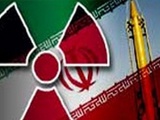|
|
TODAY.AZ / World news
Success of negotiations with Iran depends on change in position of Western countries
13 May 2011 [11:38] - TODAY.AZ
 The only way to resolve the crisis over Iran's nuclear program is still the negotiations, of which success depends on a significant change in the position of Western countries with regards to Tehran's nuclear development, experts say.
The only way to resolve the crisis over Iran's nuclear program is still the negotiations, of which success depends on a significant change in the position of Western countries with regards to Tehran's nuclear development, experts say."Unless the international powers substantially change their position regarding Iran's nuclear program, additional talks are not likely to produce meaningful results," Ted Gallen Carpenter, Vice President for Defense and Foreign Policy Studies at the Cato Institute, wrote in an e-mail to Trend.
Iranian Supreme National Security Council Secretary Saeed Jalili in a letter to the European Union Foreign Policy Chief Catherine Ashton welcomed P5+1 return to the table of negotiations.
The EU Foreign Policy Chief Catherine Ashton, in a letter sent in early February following the January talks in Istanbul, reiterated the group's position on Iran's nuclear issue. She also affirmed that the world powers were keen to continue talks with Iran without any preconditions.
The "six" of international mediators is composed of five permanent members of the UN Security Council (Russia, China, USA, France, UK), as well as Germany.
According to Carpenter, the current approach that relies on economic sanctions causes inconvenience for Iran and harms the living standards of ordinary Iranians, but it has not (and in all likelihood will not) cause the Iranian regime to abandon its nuclear ambitions.
"Instead of continuing the futile effort to get Iran to give up the goal of controlling the nuclear fuel cycle, it would be more productive for the United States and its allies to focus on getting Tehran to halt its nuclear program at the point that it has the capability to build nuclear weapons, but has not taken the step of doing so," he said.
The U.S. and other Western countries accuse Iran of developing nuclear weapons under cover of peaceful nuclear energy program. Tehran denies the charges, saying its nuclear program is aimed at covering the country's electricity needs. Iran insists that as a party to the Treaty on the Nonproliferation of Nuclear Weapons, it has every right to use nuclear technology for peaceful purposes.
So far, the UN Security Council has adopted six resolutions to suspend the nuclear program Iran, four of which involve economic and some political sanctions against Iran, and two contain warnings.
Resolutions approved by the UN Security Council, as well as additional unilateral sanctions adopted by the U.S. Congress and EU foreign ministers in the summer of 2010, primarily focused on the energy, banking and financial sector of Iran.
Carpenter believes in other words, the goal should be to get Iran to explicitly refrain from deploying a nuclear arsenal--the step that would be truly disruptive to the stability of the region.
"That may be an achievable diplomatic objective. Getting Iran to give up all of its nuclear ambitions is not," he said.
The last meeting between Tehran and the six was held in Istanbul on January 21-22. Following the meeting, Ashton said that the parties have not reached any result.
The professor at Princeton University Frank Van Hippel believes that talks are the only option to resolve the crisis around Iran's nuclear development.
"Both sides should indicate their ultimate objectives. If Iran is not seeking nuclear weapons, I think that an agreement is possible," Hippel said.
/Trend/
URL: http://www.today.az/news/regions/86106.html
 Print version
Print version
Views: 1876
Connect with us. Get latest news and updates.
See Also
- 18 February 2026 [12:32]
Netanyahu’s office releases medical report regarding cancer rumors - 18 February 2026 [09:00]
Kazakhstan to build CIS’s first green fuel plant - 18 February 2026 [08:00]
Romania leads Europe in next-generation nuclear energy - 17 February 2026 [23:33]
Engineers create balloon telescope to study exoplanet atmospheres - 17 February 2026 [21:23]
Unilever turns to Google Cloud to boost its AI initiatives - 17 February 2026 [20:21]
NASA set for second complete fueling of SLS rocket - 17 February 2026 [19:45]
Volkswagen, Renault, and Stellantis to face court in France - 17 February 2026 [14:55]
Poland backs joining nuclear project amid growing security concerns - 17 February 2026 [12:49]
Trump to 'indirectly' take part in Iran talks - 17 February 2026 [11:02]
ASCO’s “Balak?n” ferry returns to service after major overhaul, sets sail for Kazakhstan
Most Popular
 All dots above the "I" and how Baku knows how to place them
All dots above the "I" and how Baku knows how to place them
 Russia may face fresh sanctions after Navalny poisoning findings
Russia may face fresh sanctions after Navalny poisoning findings
 Belgrade hosts 1st meeting of Strategic Partnership Council between Azerbaijan and Serbia
Belgrade hosts 1st meeting of Strategic Partnership Council between Azerbaijan and Serbia
 President Ilham Aliyev, President of Serbia make press statements
President Ilham Aliyev, President of Serbia make press statements
 Decarbonization and pragmatism: how does Baku act?
Decarbonization and pragmatism: how does Baku act?
 Why Serbia matters to Azerbaijan in fractured Europe?
Why Serbia matters to Azerbaijan in fractured Europe?
 China grants visa-free entry to Canada, UK
China grants visa-free entry to Canada, UK
